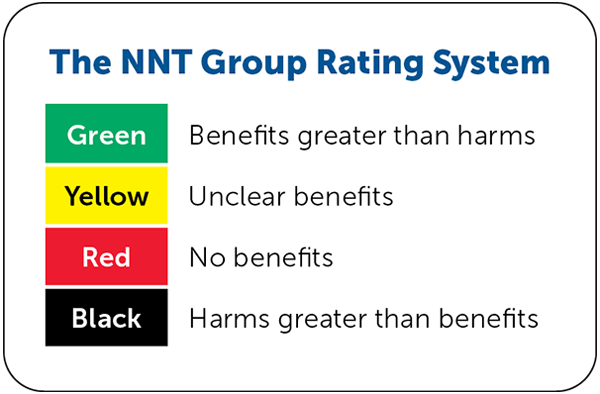
Am Fam Physician. 2016;93(9):online
Author disclosure: No relevant financial affiliations.


| Number needed to treat = 1 in 14 patients are pain-free at two hours | |
|---|---|
| Benefits | Harms |
| 1 in 14 became headache-associated pain-free at 2 hours | None developed adverse events |
| 1 in 6 reported “very good” or “excellent” scores on a global evaluation scale | |
| 1 in 9 did not use an additional rescue medication | |
Details for This Review
Study Population: Adult patients with frequent, episodic tension-type headaches
Efficacy End Points: Pain-free at one hour, pain-free at two hours, global evaluation, and use of rescue medication within six hours
Harm End Points: Any adverse events
This Cochrane review of 12 studies with 3,094 total participants sought to determine the effectiveness of ibuprofen for episodic tension-type headaches.3 All included trials were randomized comparisons of 400 mg of ibuprofen vs. placebo. Although there was no significant difference between ibuprofen and placebo at one hour, more patients treated with ibuprofen were pain-free at two hours (number needed to treat [NNT] = 14) and more likely to report “very good” or “excellent” scores on a global evaluation scale (NNT = 6). There was no significant difference in adverse events between ibuprofen and placebo.
Caveats: Overall, the evidence quality was good, with all studies being randomized and double-blinded. Some of the studies were small and some had inconsistent reporting of outcomes, but the risk for bias was considered low. Given the broad frequency of episodic tension-type headaches, the authors note it is hard to tell from this meta-analysis whether ibuprofen is more or less likely to be beneficial in those who have only one to two headache days per month compared with those who have more frequent headaches because many studies did not report baseline headache frequency. Still, use of ibuprofen seems to be well supported by the evidence in this meta-analysis, as well as by the European Federation of Neurological Societies.4
This series is coordinated by Dean A. Seehusen, MD, MPH, AFP Contributing Editor, and Daniel Runde, MD, from the NNT Group (theNNT.com).
A collection of Medicine by the Numbers published in AFP is available at https://www.aafp.org/afp/mbtn.
This review is available from the NNT Group at http://www.thennt.com/nnt/ibuprofen-treatment-episodic-tension-type-headaches/.